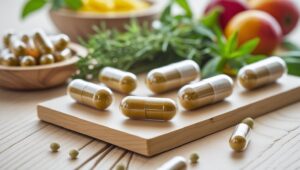Boost Your ADHD Focus: 10 Natural Supplements That Really Work
Introduction
Attention-Deficit/Hyperactivity Disorder (ADHD) is a neurodevelopmental disorder that affects millions of people worldwide, causing symptoms such as difficulty focusing, hyperactivity, and impulsivity. While prescription medications like stimulants are commonly used to manage these symptoms, many individuals are seeking natural alternatives to avoid side effects or complement their current treatment plans. Natural supplements and therapies have gained popularity due to their potential to improve focus, reduce impulsivity, and enhance productivity without the harsh side effects of conventional drugs. In this post, we’ll explore the top 10 natural medications and supplements that may help individuals with ADHD boost focus, improve cognitive function, and increase productivity. Whether you’re looking for alternatives to traditional medications or seeking ways to optimize existing treatments, this guide will provide you with valuable information on safe, natural options to consider. Always consult with a healthcare provider before starting any new supplement regimen.
1. Omega-3 Fatty Acids (Fish Oil)
Omega-3 fatty acids, particularly EPA and DHA, are essential for brain health. They support cell membrane structure, improve communication between neurons, and enhance neurotransmitter function. Studies show Omega-3s can boost cognitive performance, improve focus, reduce impulsivity, and alleviate symptoms of ADHD, contributing to better mental clarity and concentration.
Studies have shown that Omega-3 fatty acids, particularly EPA and DHA, can significantly reduce ADHD symptoms like inattention, impulsivity, and hyperactivity. Research indicates improvements in focus, cognitive performance, and emotional regulation, with some studies suggesting Omega-3 supplementation can be as effective as prescription medications for managing ADHD symptoms in both children and adults.
The recommended dosage of Omega-3 fatty acids typically ranges from 1,000 to 2,000 mg per day, though higher doses may be advised under medical supervision. The best forms are usually fish oil capsules or liquid, with the liquid offering more flexibility in dosing. Look for high-quality, purified options to avoid contaminants.
- Omega-3 Fatty Acids(Fish Oil)- https://amzn.to/4ik7GJI
- Omega-3 Fatty Acids(Fish Oil/ Kids)- https://amzn.to/3VkKkKj
2. Zinc
Zinc plays a crucial role in brain function by supporting neurotransmitter activity, enhancing communication between brain cells, and promoting the growth of neural networks. It is essential for maintaining attention, memory, and cognitive processes. Zinc deficiency has been linked to impaired attention and focus, often seen in individuals with ADHD.
Research has shown that zinc deficiency is often linked to increased ADHD symptoms, such as inattention, hyperactivity, and impulsivity. Several studies suggest that zinc plays a key role in neurotransmitter function, and its deficiency may impair brain communication, contributing to cognitive and behavioral issues. Supplementing with zinc has been shown to improve focus and reduce hyperactivity, making it a beneficial supplement for individuals with ADHD, especially when combined with other treatments.
To optimize absorption of ADHD supplements like zinc and magnesium, take them with food, as this can enhance bioavailability. For magnesium, choose forms like magnesium glycinate, which are gentler on the stomach. Avoid taking these supplements with calcium-rich foods or supplements, as they can interfere with absorption. Additionally, check for interactions with any prescribed ADHD medications, as some supplements may alter their effectiveness or cause adverse effects when combined. Always consult a healthcare provider.
- Zinc (Kids)- https://amzn.to/4eXWjVb
3. Magnesium
Magnesium plays a crucial role in brain health by regulating neurotransmitters, which are essential for mood stabilization and cognitive function. For individuals with ADHD, magnesium can help reduce symptoms like irritability, hyperactivity, and impulsivity by promoting relaxation and supporting the nervous system. It also helps in balancing dopamine levels, improving attention and focus. Adequate magnesium intake may lead to a calmer, more focused state, improving overall ADHD symptom management.
Studies have shown that magnesium supplementation can help alleviate ADHD symptoms, particularly inattention, hyperactivity, and impulsivity. Research suggests that magnesium deficiency is common among individuals with ADHD, and restoring magnesium levels may improve focus and reduce behavioral issues. Several clinical trials have found that magnesium, often in combination with other treatments, can significantly enhance cognitive function and behavior in both children and adults with ADHD.
The ideal dosage for magnesium typically ranges from 200 to 400 mg per day, depending on age, sex, and individual needs. Higher doses may cause diarrhea or digestive upset. It’s best to start with a lower dose and gradually increase. Magnesium glycinate is gentler on the stomach, while magnesium oxide may be less bioavailable. Always consult with a healthcare provider to determine the appropriate dosage and monitor for any adverse reactions.
- Magnesium (Kids)- https://amzn.to/3ZAPc0n
- Magnesium – https://amzn.to/41iKzcs

4. Ginkgo Biloba
Ginkgo Biloba is known for its ability to improve blood circulation, particularly to the brain. By increasing blood flow, it helps deliver more oxygen and essential nutrients to brain cells, which can enhance cognitive functions like memory, focus, and mental clarity. This improved circulation may also help reduce symptoms of ADHD, such as inattention and forgetfulness, making Ginkgo Biloba a popular supplement for supporting brain health and mental performance.
Studies have shown that Ginkgo Biloba may improve attention and memory in individuals with ADHD. Research indicates that it enhances cognitive function by increasing blood flow to the brain, which can help with concentration and mental clarity. Some studies suggest that Ginkgo may reduce symptoms of hyperactivity and impulsivity, making it a beneficial natural supplement for managing ADHD, particularly in children and adults struggling with attention and focus.
Ginkgo Biloba supplements are available in various forms, including capsules, tablets, liquid extracts, and teas. The typical recommended dosage ranges from 120 to 240 mg per day, divided into two or three doses. For best results, look for standardized extracts containing 24% flavonoids and 6% terpenoids, the active ingredients.
- Ginkgo Biloba (Kids)- https://amzn.to/4gnn2M
- Ginko Biloba – https://amzn.to/3Bfsph8
5. L-Theanine
L-Theanine, an amino acid found in green tea, promotes relaxation by increasing alpha brain waves, which help calm the mind without causing drowsiness. This balanced state enhances focus and attention, making it particularly beneficial for individuals with ADHD. L-Theanine can improve cognitive performance while reducing stress and anxiety.
Research has shown that L-Theanine, an amino acid found in green tea, promotes relaxation by increasing alpha brain wave activity, which helps reduce stress and anxiety without causing drowsiness. Studies suggest that L-Theanine can improve focus and attention, especially when combined with caffeine. It is believed to balance neurotransmitters like serotonin and dopamine, which are essential for mood regulation and cognitive performance, making it beneficial for those with ADHD.
For optimal benefit, the recommended dosage of L-Theanine is typically 100-400 mg per day, taken in divided doses. It’s best consumed in the morning or early afternoon to enhance focus without causing drowsiness. For those with ADHD, it’s ideal to start with a lower dose and gradually increase as needed.
Certain natural ADHD supplements can interact with prescription medications, potentially affecting their efficacy or causing side effects. For example, magnesium may interfere with certain antibiotics or blood pressure medications, while Rhodiola could interact with antidepressants. It’s crucial to consult a healthcare provider to avoid harmful interactions when combining supplements with medications.
- L-Theanine- https://amzn.to/3ZDGkXO
- L-Theanine (Kids)- https://amzn.to/3ZsZiPM
6. Rhodiola Rosea
Rhodiola Rosea is an adaptogenic herb known for its ability to help the body adapt to stress and fatigue. It works by balancing cortisol levels and enhancing energy, which can be especially beneficial for ADHD sufferers who may experience mental fatigue, stress, or lack of focus. By reducing stress and improving cognitive function, Rhodiola can help individuals with ADHD maintain better focus, concentration, and productivity throughout the day.
Research suggests that Rhodiola Rosea can enhance cognitive function by improving mental clarity, focus, and memory. Studies have shown its adaptogenic properties help the body manage stress, reducing fatigue and anxiety, which are often linked to ADHD. Rhodiola’s mood-stabilizing effects are supported by evidence indicating it can balance neurotransmitter levels, promoting a calm and alert state, which can ultimately improve attention and concentration in individuals with ADHD.
- Rhodiola Rosea- https://amzn.to/41kGWD8

7. Bacopa Monnieri
Bacopa Monnieri is a powerful natural nootropic known for its ability to enhance memory, focus, and cognitive performance. Often used in traditional medicine, Bacopa has been shown to improve attention, information processing, and learning ability. Studies suggest it may also reduce anxiety and stress, helping individuals with ADHD stay calm and focused. Its cognitive benefits make it a popular supplement for boosting mental clarity and overall brain health.
Research supports Bacopa Monnieri’s use in improving cognitive function, especially in individuals with ADHD. Studies have shown that Bacopa enhances memory, attention, and processing speed in both children and adults with cognitive impairments. It works by modulating neurotransmitters like serotonin and dopamine, which are essential for focus and attention. Clinical trials have demonstrated its potential to reduce ADHD symptoms, making it a promising natural supplement for managing the condition.
- Bacopa Monnieri- https://amzn.to/49loMmm
- Bacopa Monnieri (Kids)- https://amzn.to/4ggqjwo

8. Iron
Iron plays a crucial role in brain health, particularly in the production of dopamine, a neurotransmitter involved in attention, focus, and mood regulation. Low iron levels have been linked to various cognitive and behavioral issues, including worsened ADHD symptoms. Research suggests that iron deficiency can exacerbate attention problems, impulsivity, and hyperactivity, which are hallmark traits of ADHD. Studies have shown that children with ADHD often have lower iron levels compared to those without the disorder. Addressing iron deficiency through diet or supplements may help improve symptoms, though it’s important to consult with a healthcare provider before starting supplementation.
The best dietary sources of iron include red meat, poultry, fish, beans, lentils, tofu, fortified cereals, spinach, and pumpkin seeds. For better absorption, pair iron-rich foods with Vitamin C-rich options like oranges, bell peppers, or broccoli. For those needing supplements, iron supplements are available in ferrous sulfate, ferrous gluconate, and ferrous fumarate forms. It’s important to follow recommended dosages, as excessive iron intake can lead to side effects.
Iron deficiency can lead to symptoms such as fatigue, weakness, pale skin, dizziness, shortness of breath, and cold hands or feet. Other signs include headaches, brittle nails, and a rapid heart rate. To monitor iron levels, blood tests like serum ferritin or hemoglobin tests are commonly used. If deficiency is suspected, it’s important to consult a healthcare provider who can recommend appropriate supplements or dietary changes to address the issue.
Iron overdose can be harmful, especially in children, leading to symptoms like nausea, vomiting, abdominal pain, and diarrhea. In severe cases, it can cause organ damage, particularly to the liver, and even be fatal. It’s essential to follow recommended dosages and consult a healthcare provider before supplementing with iron.
- Iron (Kids)- https://amzn.to/4izRNPN
- Iron – https://amzn.to/3D1ebky
9. Vitamin B6
Vitamin B6 plays a crucial role in the synthesis of neurotransmitters such as serotonin, dopamine, and norepinephrine, all of which are essential for regulating mood, focus, and attention. Serotonin helps stabilize mood and promote a sense of well-being, while dopamine is critical for motivation, focus, and reward processing. Adequate levels of Vitamin B6 ensure that these neurotransmitters are produced efficiently, supporting brain function and emotional regulation. For individuals with ADHD, maintaining balanced levels of Vitamin B6 may help improve attention span, reduce impulsivity, and stabilize mood, making it an important nutrient in managing ADHD symptoms.
Research has shown that Vitamin B6 can be particularly effective in managing ADHD when used in combination with other supplements, such as Magnesium and Zinc. Studies suggest that B6 enhances the synthesis of neurotransmitters like dopamine and serotonin, which are crucial for regulating attention and mood. When combined with Magnesium and Zinc, B6 may improve overall cognitive function and reduce ADHD symptoms more effectively than when used alone.
For Vitamin B6 (pyridoxine), the recommended dosage varies depending on age and individual needs. For adults, typical doses range from 1.3 to 2.0 mg per day, though higher doses up to 50 mg are often used for specific conditions like ADHD, under healthcare guidance. It is available in various forms, including tablets, capsules, and liquid supplements. Always follow the dosage instructions on the product label or as prescribed by a healthcare professional to avoid toxicity.
- Vitamin B6 (Kids)- https://amzn.to/49k8ydt
- Vitamin B6 – https://amzn.to/3B3NA5X
10. Ashwagandha
Ashwagandha is an adaptogenic herb known for its ability to reduce stress and anxiety by regulating cortisol levels in the body. For ADHD sufferers, managing stress is crucial as it can exacerbate symptoms like distractibility and hyperactivity. By promoting relaxation and improving overall mood, Ashwagandha helps enhance focus and mental clarity. Its calming effects support better cognitive function, making it a valuable supplement for those seeking natural ADHD management.
Scientific studies and anecdotal evidence suggest that Ashwagandha can be beneficial for managing ADHD symptoms. Research has shown that its adaptogenic properties help reduce stress and anxiety, which are often co-occurring issues in individuals with ADHD. By lowering cortisol levels and promoting relaxation, Ashwagandha may improve focus and cognitive function. Anecdotal reports from ADHD patients also highlight its calming effects, leading to better attention and productivity. While more research is needed, these findings suggest promising benefits for ADHD management.
Ashwagandha is available in several forms, including capsules, powders, and liquid extracts. Capsules are the most convenient, with typical dosages ranging from 300 to 600 mg per day. Powders can be mixed into smoothies or teas, with a common dose of 1 to 2 teaspoons daily. Liquid extracts are more concentrated, and the recommended dosage is usually 1 to 2 ml per day. It’s best to start with a lower dose and gradually increase, depending on individual tolerance and health goals.
- Ashwagandha – https://amzn.to/4io37y4

Conclusion
In conclusion, natural supplements can play a significant role in managing ADHD symptoms, particularly when combined with traditional treatment methods. The top 10 ADHD natural medications and supplements discussed—such as Omega-3 fatty acids, Zinc, Magnesium, and Rhodiola Rosea—offer potential benefits in enhancing focus, reducing hyperactivity, and improving cognitive function. However, it’s crucial to remember that each individual responds differently, and results may vary depending on the person’s specific needs and health profile. Always consult with a healthcare professional before introducing new supplements to ensure they complement any existing treatment plan and avoid potential interactions. It’s also important to adopt a holistic approach to managing ADHD, which may include lifestyle changes like regular exercise, a balanced diet, and mindfulness practices. By combining natural supplements with a comprehensive treatment plan, individuals with ADHD can better manage their symptoms, boost productivity, and improve overall quality of life.




